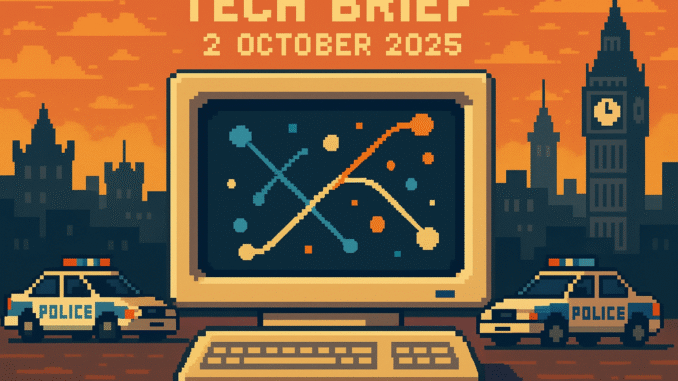
Tech Brief 2 October 2025 lands with Wales testing quantum patrols, AOL changing hands, and the privacy debate roaring back into the spotlight. If you missed yesterday’s Tech Brief, you can catch up here before diving in.
North Wales Police Deploys Cloud-Based Quantum Computing for Patrol Routing
“Imagine your Amstrad CPC suddenly running emergency services.” Not quite, but North Wales Police has piloted a hybrid quantum computing solution via D-Wave’s cloud, aiming to cut emergency response times in half. This is not a theoretical exercise. Officers report real-world improvements on the ground. Quantum solvers allocate patrols and resources across the Welsh region in real time, automating what once required frantic phone calls and maps scribbled in blue biro.
Wales has a history of tech ingenuity. The Dragon 32 is a classic example. While designed and assembled in Wales, the Dragon 32’s legacy is a distinctly local answer to the home computing boom. That spirit feels alive in this effort.
Quantum technology often gets stuck in hype cycles, but patrol cars and quick responses are as grounded as tech gets. The rollout sets new benchmarks for public sector modernisation and puts Wales on the map as a quiet, clever innovator again.
Yahoo Plans to Sell AOL to Italy’s Bending Spoons for $1.4 Billion (£1.15 Billion)
AOL is changing hands. Yahoo, caretakers of this venerable dial-up pioneer, are set to sell AOL to Italian tech company Bending Spoons for $1.4 billion (£1.15 billion). These days, AOL is a brand more recognised for “You’ve Got Mail” references than its actual user base. Bending Spoons will inherit a legacy of chat rooms, news portals, and a classic web identity now reduced to a digital asset on a spreadsheet.
We all remember the thrill of our first web chat or the relief of a successful driver download through an AOL interface. But this deal is also about present-day tech. Bending Spoons built its own reputation by revamping ageing brands. Will AOL be reborn, or is this simply the latest step in the slow fade of the old internet? The outcome is open, and Bending Spoons’ next move is one to watch.
Collapse in Support for Digital ID Cards After Starmer’s Plan Revealed
Here are the numbers. Public support for digital ID cards in Britain has dropped from 35 percent to minus 14 percent. The sharp change followed Keir Starmer’s announcement backing their introduction; British aversion to surveillance has deep roots. Decades ago, arguments raged on message boards, in pub corners, and around C90 tape swaps about privacy, government overreach, and the steady spread of CCTV.
The collapse in support is a headache for Labour, but also a cultural gut reflex. For many in Netscape Nation’s generation, privacy was a basic right. The sight of another digital ID proposal instantly revives suspicion, not optimism.
With digital policing and cloud decision-making featuring in today’s stories, it is worth asking if British scepticism about data collection is a bug or a feature. The answer is neither neat nor finished.
Ministers Push for New Rules on Police Use of Facial Recognition
A blunt fact. The Home Office will consult on stricter rules for facial recognition cameras following privacy complaints and high-profile event controversies. Sarah Jones, policing minister, says the aim is to balance crime prevention with public rights. Critics, of course, remember years of debates over privacy, from the first widespread CCTV installations to recent stories about digital IDs.
This initiative is not just about technology catching up with social values. It is about addressing a rising sense that boundaries are being tested, often with the best of intentions. The consultation asks the public for views, echoing those earlier pushbacks against state surveillance.
What happens if people say no again? No tidy answer, but the tension is useful. As above, digital innovation demands consent, not just implementation.
From the Wayback Machine
On This Day: 1955 – ENIAC Retired
ENIAC, the first general-purpose electronic computer, was taken offline on 2 October 1955. Designed in the 1940s, ENIAC used vacuum tubes and took up nearly 1,000 square feet, making it a giant both in size and in computing capability for its time. John Mauchly and J. Presper Eckert led its creation, while a team of women pioneered programming its 5,000 operations per second. Later, smaller British computers like the EDSAC found smarter ways to shrink computing, but ENIAC’s legacy remains, blinking quietly in every boot screen and BIOS flash today.
Today’s Big Question
Has British scepticism toward new tech shaped better digital rights, or have we simply slowed down progress every step of the way? Tech Brief 2 October 2025 leaves that for you, and Parliament, to argue.
There’s a reason we keep old machines running. They remind us what was possible with limited resources, and who still sets the rules. Stay curious.
Missed yesterday’s Tech Brief? Catch up here

Leave a Reply